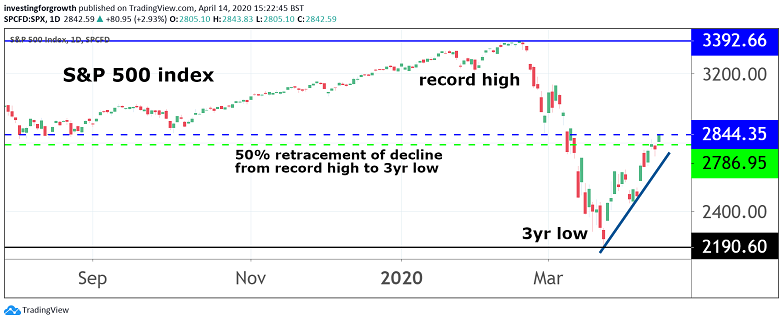Fund manager survey: bank shares, UK stocks, dash for cash
Here’s what pro investors expect of company profits, sectors they’re buying and catalysts for recovery.
14th April 2020 15:29
by Graeme Evans from interactive investor
Here’s what pro investors expect of company profits, sectors they’re buying and catalysts for recovery.

A results season like no other gets underway this week with investors the most pessimistic since the 9/11 terrorist attacks in 2001 and braced for a certain global recession in 2020.
The latest monthly Bank of America (BofA) fund manager survey also finds that investors are “very long” in healthcare, staples, utilities, US, tech, and bonds. They are “very short” energy, equities, materials, industrials, UK, banks and the eurozone.
JPMorgan Chase set the tone today for what will be a brutal results season when it reported a 69% slide in first quarter profits. It also set aside US$6.8 billion to cover potential losses on loans to consumers and businesses struggling during the coronavirus shutdown.
- US earnings preview: six stocks and themes to watch
- The Week Ahead: oil sector dividends, Q1 results
- Should you buy this stock market dip?
Forecasting the rest of Wall Street's Q1 figures is a thankless task when the magnitude of the expected economic slowdown is outside any previous experience.
Deutsche Bank's best estimate is for S&P 500 earnings per share (EPS) to fall by 12% quarter-on-quarter in the first three months of 2020, followed by a 35% tumble in Q2. With no return to trend due until late 2021, this year is on track for a 20% decline in EPS to $133.
The EPS estimates from Deutsche are based on its economists predicting an unprecedented 33% annual drop in US Q2 GDP, which would be more than three times the previous biggest decline in 1958 and four times greater than that seen in the worst quarter of the financial crisis.
It's no wonder that respondents to the BofA fund manager survey, which accounts for more than $500 billion of assets under management, said cash levels jumped from 5.1% to 5.9% in April and well above the 4.6% long-term average.
This month's figure is the highest level since 9/11, although BofA thinks this might represent “peak pessimism”.
Equity allocation is currently the lowest since March 2009 when the S&P 500 plunged to 666 points during the financial crisis.
The allocation to UK equities dropped 10 percentage points last month, making it the number one ‘underweight’ region in the survey.
Bank of America analysts, noting that investor positioning is “very bearish”, believe “one last leg” to the rally is likely, but add “we take profits [in the S&P 500 index at] 2850-3000.” The broad US index just traded at 2,843.83, a five-week high.

Source: TradingView Past performance is not a guide to future performance
While almost all respondents view a global recession as inevitable in 2020 – a record net 93% believe there will be at least two consecutive quarters of GDP decline in the next 12 months, versus 86% at the previous peak in March 2009 - it is the prospect of cuts to EPS rather than to GDP forecasts that investors are now watching for.
More than half of respondents think that the economic recovery from the Covid-19 shock will be U-shaped, compared with 22% who say it will be W-shaped and 15% hoping for a V-shaped rebound.
The survey found that investors are continuing to own technology stocks and increase their exposure to defensives, such as healthcare and staples, and to slash allocations to sectors geared to cyclical growth such as energy, resources and banks.
In fact, allocation to banks slumped 13 percentage points to a net 28% underweight, the lowest level since August 2012.
Backers of distressed cyclicals will be hoping that a Covid-19 vaccine is delivered soon, given that a health breakthrough is seen as the best bull case alongside a resumption of Chinese credit growth.
These articles are provided for information purposes only. Occasionally, an opinion about whether to buy or sell a specific investment may be provided by third parties. The content is not intended to be a personal recommendation to buy or sell any financial instrument or product, or to adopt any investment strategy as it is not provided based on an assessment of your investing knowledge and experience, your financial situation or your investment objectives. The value of your investments, and the income derived from them, may go down as well as up. You may not get back all the money that you invest. The investments referred to in this article may not be suitable for all investors, and if in doubt, an investor should seek advice from a qualified investment adviser.
Full performance can be found on the company or index summary page on the interactive investor website. Simply click on the company's or index name highlighted in the article.